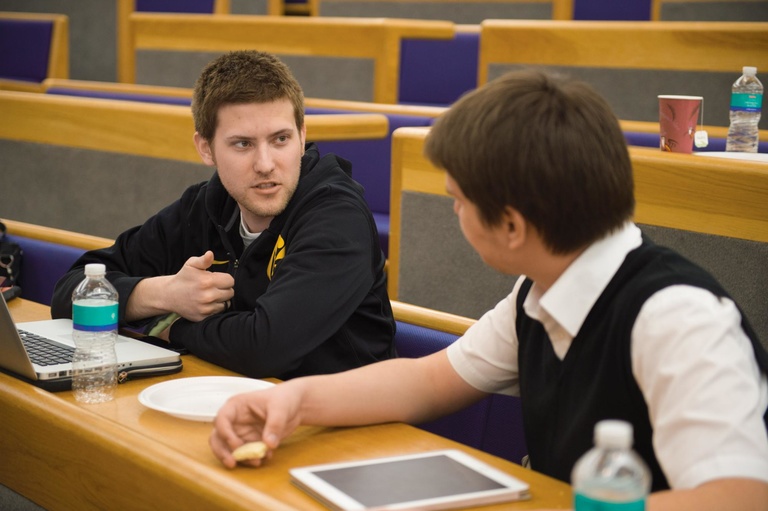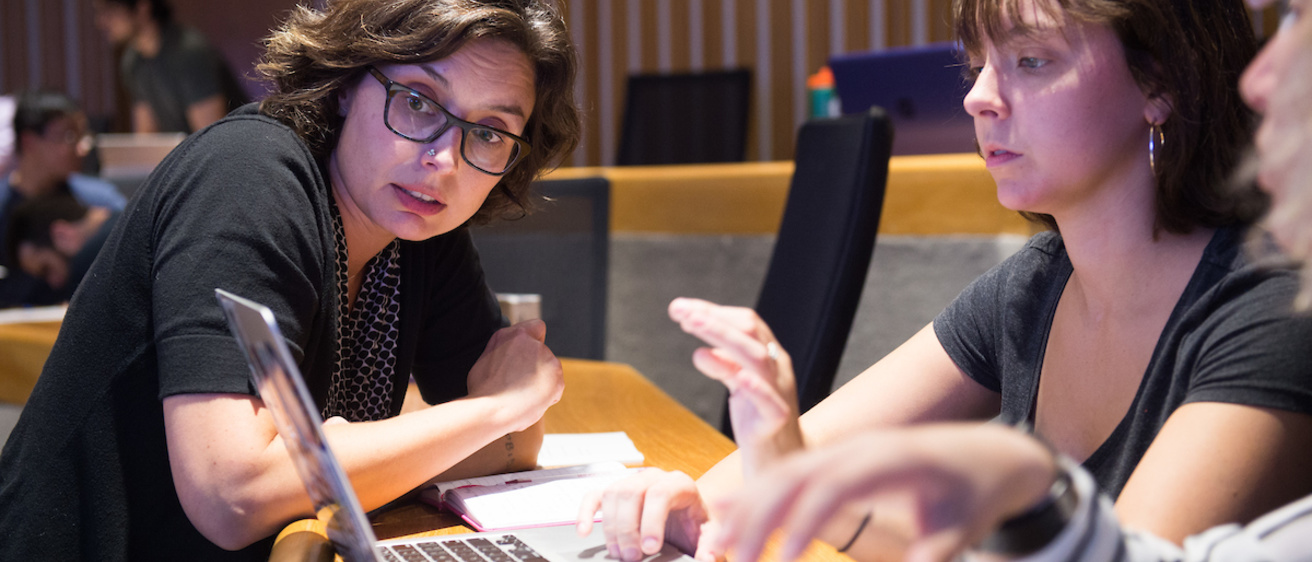A pair of new legal clinics at the University of Iowa College of Law offers students unique learning opportunities related to transactional and criminal law, as well as hands-on experience in working with clients and appearing in federal court.
The Community Empowerment Law Project, run by Daria Fisher Page, and the Federal Criminal Defense Clinic, overseen by Alison K. Guernsey, launched in January 2018 after several months of preparation by the two associate clinical professors of law.
The trial-level federal defense clinic is only the second of its kind in the nation. The other is at the University of Chicago, Guernsey says.
Students in both clinics work directly with clients, though the type of legal work done in the two clinics varies greatly—the Community Empowerment clinic is transactional and currently focuses on work with nonprofit organizations and municipal governments which ranges from creating new entities to strategic advocacy planning.
“One of the primary goals for Iowa Law was creating a transactional clinic, or a non-litigation clinic, where students could get a different set of legal skills,” Fisher Page says. “So my mission for the clinic is to make sure that the students really understand how to unpack a complex problem, see their legal skills as one approach to problem-solving, and appreciate that they really need to engage the client and the larger community to bring about social change.”
Students in the Federal Criminal Defense Clinic, on the other hand, represent people who have been accused of federal crimes in the U.S. District Courts for the Northern and Southern Districts of Iowa and cannot be represented by the federal public defender’s office, or individuals accused of violating the conditions of their supervised release. After the court assigns the clinic a case, the students handle every facet of that case.
“The students work it from the initial appearance to the end, whether that be acquittal, conviction and sentencing, or direct appeal,” Guernsey says.
UI College of Law

Iowa Law is an ideal place to study law: small enough that your professors will know you well, yet large enough to be nationally renowned and a launchpad for opportunity. Learn more…
Fisher Page’s students in the first semester of the clinic worked with the 1105 Project, a group of four nonprofits based in Iowa City; the Campaign for Youth Justice, partnered with the Johnson County Disproportionate Minority Contact Committee; and the East Central Intergovernmental Association. The partnership with ECIA was formed through the Community Empowerment Clinic’s new partnership with the university’s Iowa Initiative for Sustainable Communities, part of the Office of Outreach and Engagement.
Students in the Community Empowerment Clinic were divided into groups, assigned to a client, and performed a variety of work for the organizations. For example, students assigned to the ECIA looked into how to address blighted and abandoned properties and how to address the shortage of affordable housing. Fisher Page says creating a regional or statewide land bank that could acquire property and place conditions on its development became the focus of students’ work.
“The team of students who worked on that project are coming back this semester to draft legislation that we hope will lead to the creation of a land bank in Iowa at some point in the future,” she says.
Andrea Mallarino, a third-year law student from Ames, Iowa, worked with the Washington, D.C.–based Campaign for Youth Justice to examine issues related to the incarceration of youth in Iowa. Mallarino says she and her classmates met with local stakeholders, such as judges, attorneys, law enforcement officials, and incarcerated youth.
“That was a really powerful experience talking to them and hearing their story,” Mallarino says of the juveniles. “We got to get a real, on-the-ground look at what the system is in Iowa and how the different stakeholders experience that.”
The end result of the group’s work was a more than 150-page summary of the interviews and recommendations on how to decrease the number of juveniles incarcerated in adult facilities in Iowa.
Mallarino says there were numerous benefits to her clinic experience, which she describes as her favorite part of law school thus far. Mallarino says the clinic showed her what it’s like to work with clients in the real world. She added that the work she did has an impact, such as leading to reforms in the criminal justice system.
“It’s not just a grade,” she says. “It’s seeing how this can affect others.”
In the defense clinic, two student attorneys—who are certified law student practitioners under the local court rules—and a student investigator are assigned to each case. The student attorneys, who practice under Guernsey’s law license, appear in court on behalf of their client and the student investigator provides support.
“On average, each student spends approximately 30 hours per week working on their cases,” Guernsey says. “If the case requires that they work more, they do work more. Their weeks are unpredictable, chaotic, and nose to the grindstone. I’m trying to make sure they get a handle not only on the law and procedure, but that the students develop a wide range of skills that ensure the person whose life is in their hands gets the best representation possible. Sometimes our focus is on a ‘traditional’ lawyering skill, such as developing an effective cross examination; other times, it’s about learning skills like empathy.”
In addition to the courtroom work, students travel to local jails to meet with their clients, develop litigation plans, negotiate with the U.S. Attorney’s Office, and conduct witness interviews. The students are expected to perform the same work as a professional defense attorney over the course of a case.
Guernsey, who previously served as the supervising attorney for the Federal Defenders of Eastern Washington and Idaho, says students spend days preparing for a single court hearing and trying to anticipate what might happen in the proceedings.
“They have to be flexible and make decisions in consultation with me on the fly,” she says. “It can be pretty exciting, pretty anxiety-inducing, and the process instill in students the gravity and uncertainty of what the legal profession is.”
Abe Copi, a third-year law student from Springfield, Illinois, admits that the defense clinic was intimidating at first.
“I’d never appeared in court and the first time I did was in federal court,” Copi says.
Copi intends to go into criminal law as a prosecutor, but says the defense clinic has been eye-opening and “stereotype busting.”
“I thought our clients would be difficult to work with,” he says. “Each one of my clients has been great to work with. They’ve been very helpful working on their case. They’ve been respectful. It makes you see people as more than just names on a page. I really appreciated that takeaway.”
Copi says he believes that participating in one of only two trial-level federal defense clinics in the country will set him apart from his peers when he’s interviewing for jobs.
“This is a very unique experience,” he says. “Very few law students can say they’ve argued in a federal court. It definitely sets you apart from the pack.”
